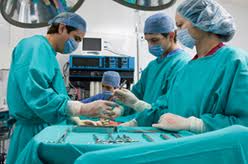 Hospital acquired infections (HAI), also known as “healthcare-associated infections” or “nosocomial” infections, are infections that patients get while undergoing medical treatment in healthcare facilities. They are infections that are not present and without evidence of incubation at the time the patient is admitted to a healthcare facility. Most infections that become clinically evident after 48 hours of a patient’s hospitalization are considered hospital acquired. These infections occur in all types of medical facilities, including hospitals, outpatient surgical and care centers, and long-term care facilities, such as nursing homes and rehabilitation centers.
Hospital acquired infections (HAI), also known as “healthcare-associated infections” or “nosocomial” infections, are infections that patients get while undergoing medical treatment in healthcare facilities. They are infections that are not present and without evidence of incubation at the time the patient is admitted to a healthcare facility. Most infections that become clinically evident after 48 hours of a patient’s hospitalization are considered hospital acquired. These infections occur in all types of medical facilities, including hospitals, outpatient surgical and care centers, and long-term care facilities, such as nursing homes and rehabilitation centers.
For example, consider the case of a patient who is admitted to the hospital to undergo orthopedic surgery, such as a hip or knee replacement. The surgery is successful from an orthopedic standpoint. However, while recovering in the hospital, the patient develops a life-threatening Staph infection. Or, consider the case of a patient who undergoes successful surgery to remove a benign growth from her body, only to develop an infection caused by a contaminated surgical instrument. In both cases, the surgeries were considered a success, but the outcomes were dramatically and negatively impacted by the hospital acquired infections. In its February 22, 2012 broadcast, the Today show on NBC featured a story entitled TODAY Investigates: Dirty surgical instruments a problem in the OR, reporting on other, real-life victims of hospital acquired infections.
Hospital acquired infections are among the leading causes of preventable deaths in the United States.1 HAIs cause more deaths in the U.S. each year than automobile accidents, fires and drownings combined. Such infections lead to extended hospital stays and result in substantially increased medical costs. The U.S. Centers for Disease Control and Prevention (CDC) published a study in 2009 which concluded that the medical costs to the U.S. of hospital acquired infections ranges from $28 billion to $34 billion annually.2 Considering the extraordinary costs of HAIs to the public and the government, one would hope that a greater emphasis would be placed on preventing such infections.
 Georgia Injury Lawyer Blog
Georgia Injury Lawyer Blog

